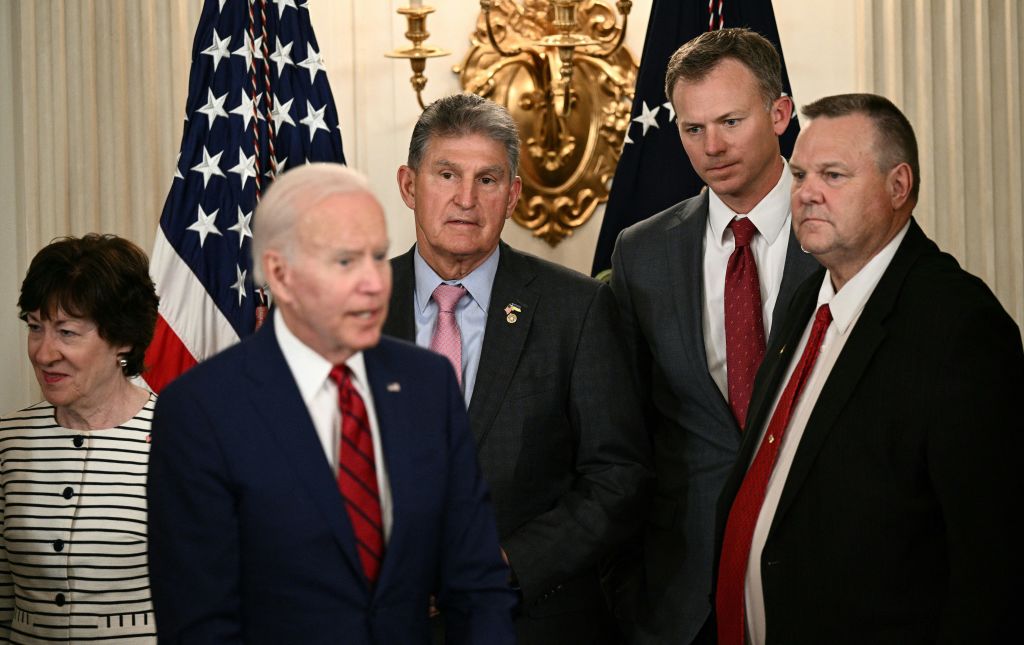U.S. Senator Rankings: Manchin, Sinema Are Among America’s Least Popular Ahead of Potential Campaigns

Key Takeaways
Seven in 10 Wyomingites approve of Sen. John Barrasso’s job performance, making him the most popular senator. Senate Republican leader Mitch McConnell remains America’s most unpopular senator, with roughly 3 in 5 Kentucky voters expressing disapproval.
As Sen. Joe Manchin mulls a re-election bid, the latest surveys show that 55% of West Virginia voters disapprove of his job performance, while 39% approve. Manchin is far less popular than Gov. Jim Justice (R-W.Va.), who is running for his seat.
Sen. Jon Tester’s net approval in Montana is 51 percentage points higher than Joe Biden’s in his state, marking the widest popularity advantage between a Democratic senator and the president in states with competitive Senate elections next year.
Roughly half of Utah Republicans (48%) approve of Sen. Mitt Romney’s job performance, up 10 points since the first quarter of 2021.
Sign up to get the latest data and analysis on how business, politics and economics intersect around the world.
How the senators stack up
Sen. John Barrasso of Wyoming boasts a 70% approval rating in his state, making him the most popular senator, according to surveys Morning Consult conducted April 1-June 30 in all 50 states.
On the other side of the coin, Senate Republican leader Mitch McConnell remains America’s most unpopular senator, with roughly 3 in 5 Kentucky voters expressing disapproval of his job performance. His current position is in line with his standing in the first quarter of 2023, driven by his continued poor standing among Republican voters following his 2020 re-election.
America’s Most and Least Popular Senators
McConnell’s standing is only slightly worse than that of Sen. Joe Manchin (D-W.Va.), the Senate’s most vulnerable Democrat, who has yet to say whether he’ll seek re-election next year as he flirts with a third-party presidential bid. A 55% majority of West Virginia voters disapprove of his job performance, while 39% approve. That leaves Manchin much more unpopular than West Virginia Gov. Jim Justice, who’s running in a competitive Republican primary for his seat.
Like Manchin, independent Sen. Kyrsten Sinema of Arizona is also more disliked than liked by voters in her state — albeit just barely, and she has made up some ground with Democratic voters in recent months.
Sinema’s Approval Has Increased Among Democrats Since Leaving the Party
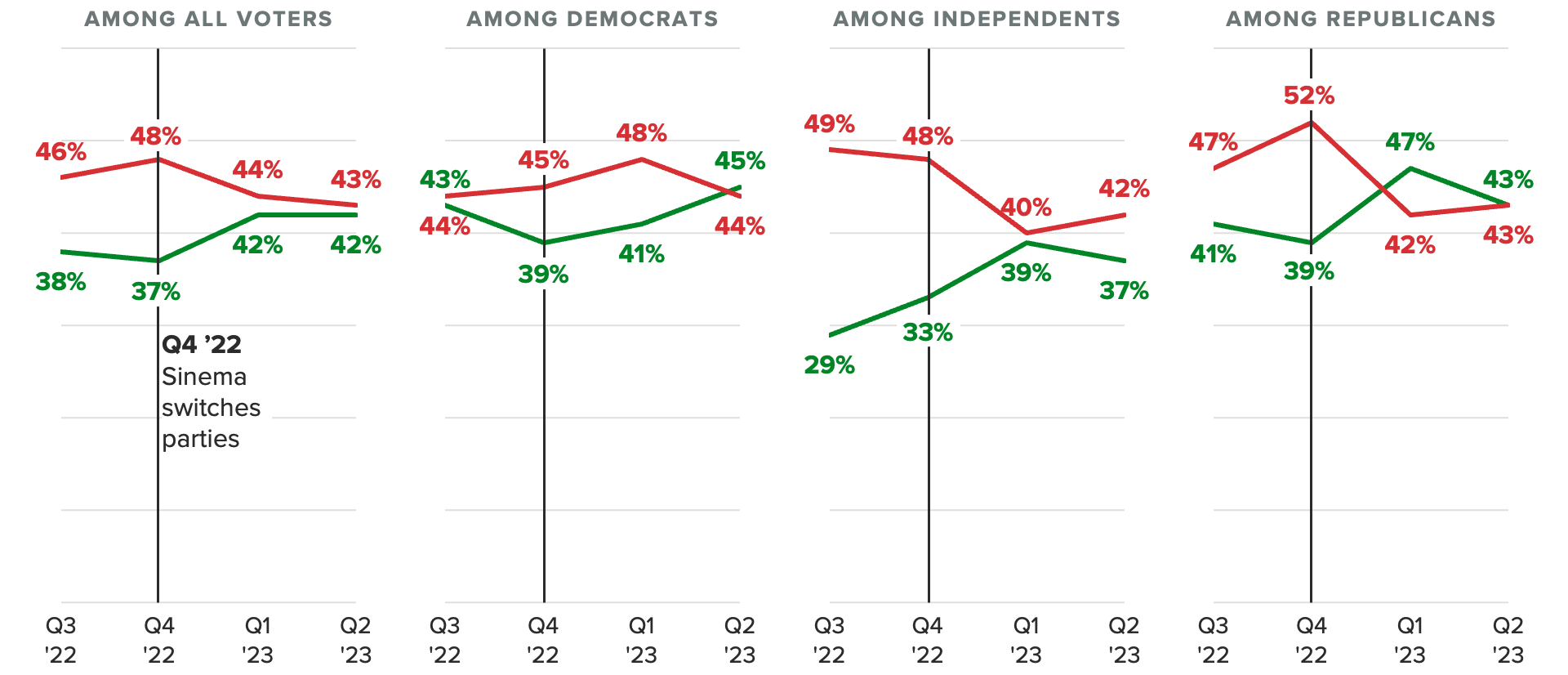
Negative views of Sinema increased among Arizona’s Democratic voters after she left the party in December, prompting Rep. Ruben Gallego (D-Ariz.) to launch a campaign for her seat. But according to our latest surveys, Sinema now gets better marks with Democrats — as well as independents and Republicans — than she did before becoming an independent.
Sinema’s approval rating remains slightly underwater among all voters in her state, with 43% disapproving and 42% approving. But if she decides to run for re-election, the recent upswings could give her a fighting chance depending on the style of candidate who emerges from what could be a nasty and fringe-empowering Republican primary.
What we do that’s different: We survey thousands of U.S. voters every day, producing exclusive daily tracking on how they feel their senators and governors are doing. These results are aggregated and published quarterly to ensure comparable sample sizes for all 50 states.
Why this matters: We’ve surveyed voters in all 50 states on their state's leader approval since January 2017. That rich trend data offers a rare look at the changes in voter approval for governors and senators over time.
Looking at the rest of the competitive Senate map in 2024, all eyes are on seven Democratic-held seats, from Manchin’s and Montana Sen. Jon Tester’s in red states to those in presidential battlegrounds such as Pennsylvania and Nevada. Besides Manchin, no vulnerable Democratic incumbent’s approval rating is underwater — and even Manchin is massively outperforming President Joe Biden’s stubbornly low job approval rating.
Vulnerable Democrats Continue to Outperform Biden’s Approval Rating
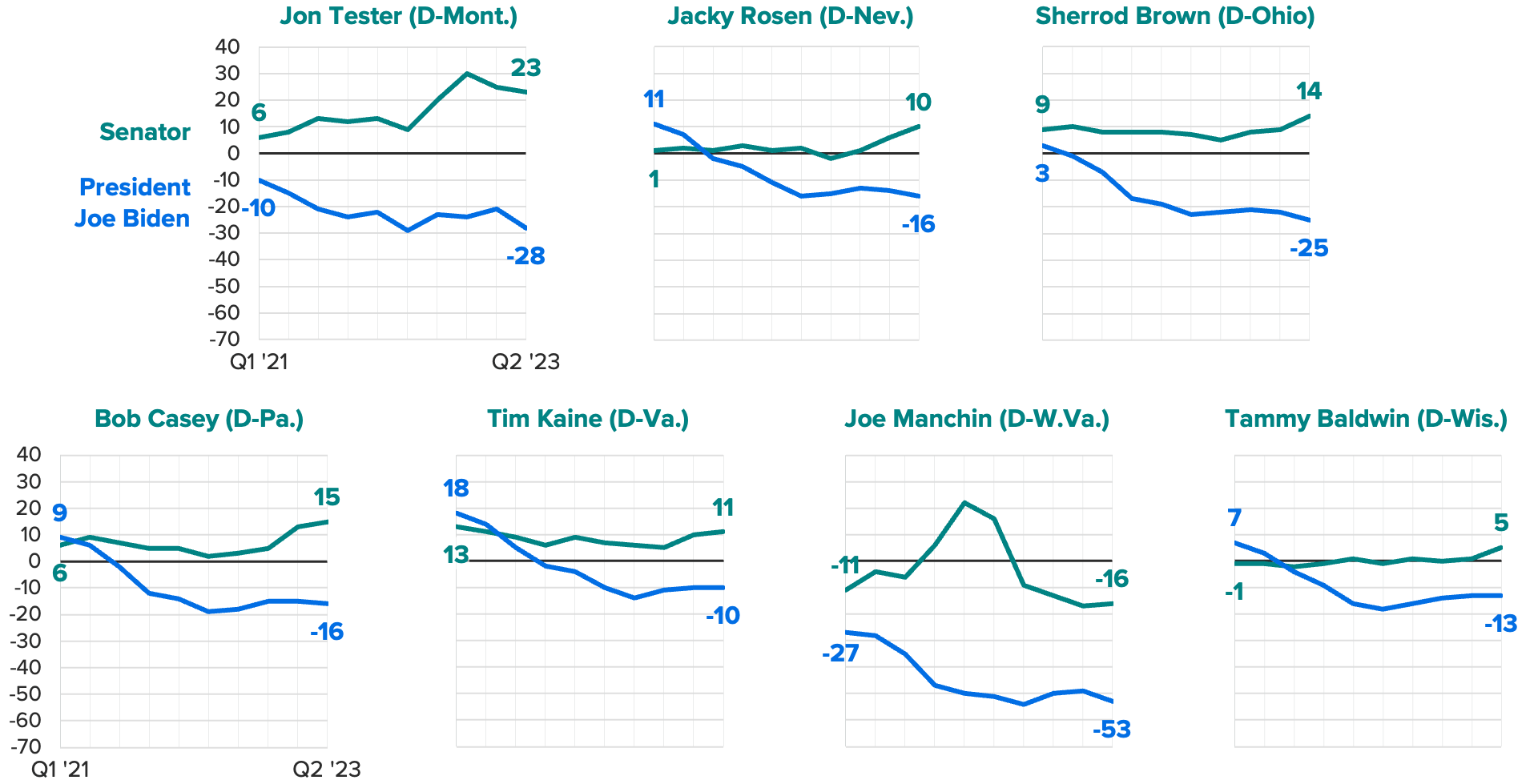
In Montana, Tester’s net approval rating — the share of voters who approve of him minus the share who disapprove — is 51 points better than Biden’s. It marks the widest popularity advantage between a Democratic senator and the Democratic president among the states with competitive elections next year.
Tester and Manchin aren’t alone.
Ohio Sen. Sherrod Brown, a populist progressive who’s running for re-election next year in a state that Biden lost by 8 points in 2020, has a 39-percentage point net approval advantage over the White House incumbent. And Pennsylvania Sen. Bob Casey, whose state narrowly flipped for Biden in the last presidential election, bests the president’s net approval rating by 31 points.
This dynamic continues a trend from the 2022 midterms, when Democrats managed to separate themselves from Biden’s unpopularity due in part to former President Donald Trump’s continued presence on the political stage. It may indeed prove harder for incumbents to distance themselves from the top of the ticket in the 2024 elections. But their advantage over Biden’s poor numbers marks a formidable starting point as the GOP grapples with competitive primaries that are being overshadowed by the unwieldy presidential contest.
Romney sees a mild Republican revival
Sen. Mitt Romney (R-Utah) began Biden’s presidency with terrible numbers among Republican voters in his state following his two votes to impeach Trump. That persisted for the better part of two years, but there are signs things are starting to improve.
Romney’s Approval Rating Has Improved Among Utah Republicans Since Trump Rift
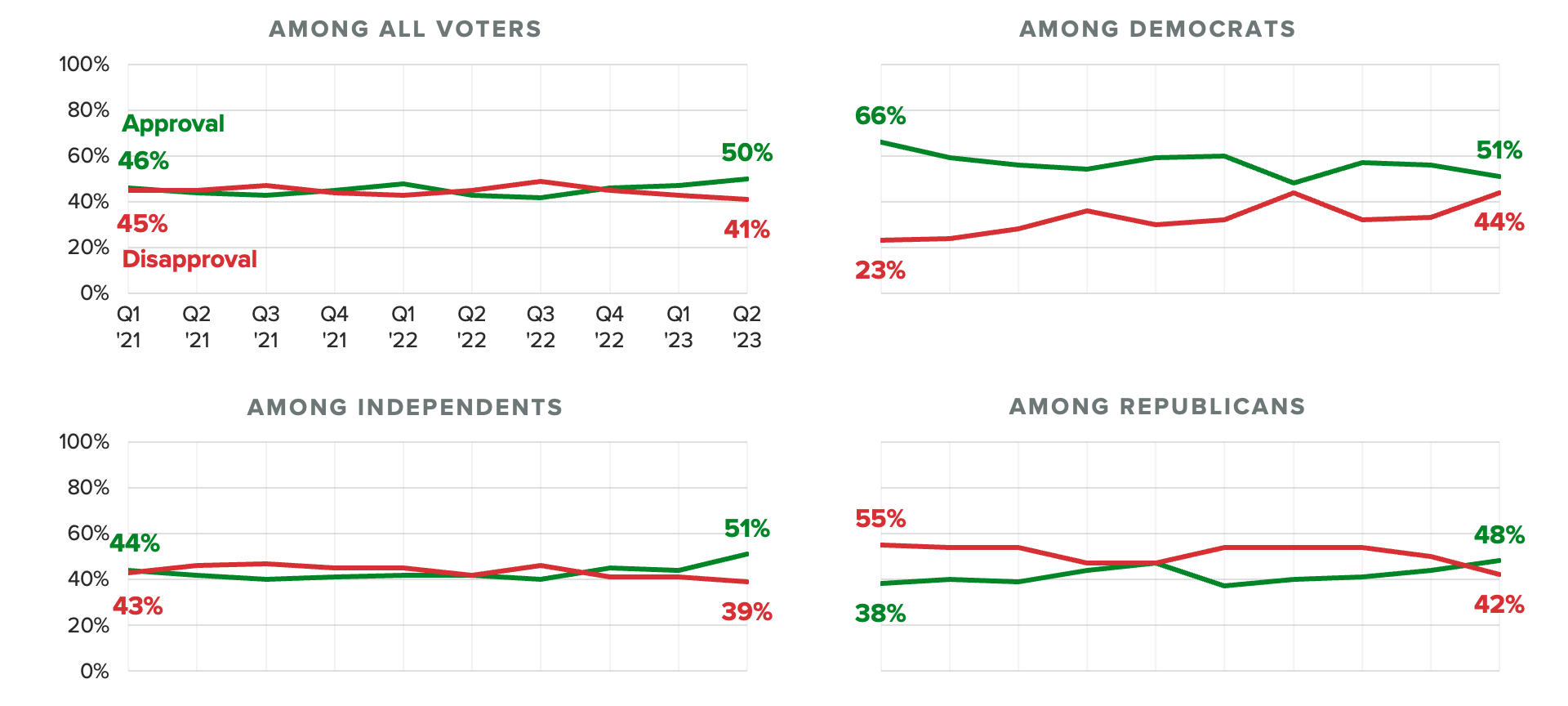
Utah Republicans are now 6 points more likely to approve than disapprove of his job performance (48% to 42%). This marks a 10-point improvement in his approval rating since the first quarter of 2021, when he stared down a censure vote by Utah Republicans for twice voting to impeach Trump. Similarly, Romney’s standing has improved among his state’s independent voters, contributing to his overall approval rating increasing to 50%.
Romney won’t go unchallenged if he seeks re-election, but he is expected to face few risks should he make it to next year’s general election: Like most contests featuring incumbent GOP Republican senators, Utah’s Senate race is viewed as safe Republican territory.
Race raters expect a bit more of a challenge for Republican Sens. Ted Cruz and Rick Scott, who are running for re-election in Texas and Florida, respectively.
Cruz and Scott Get Positive Marks Ahead of Contested Re-election Campaigns
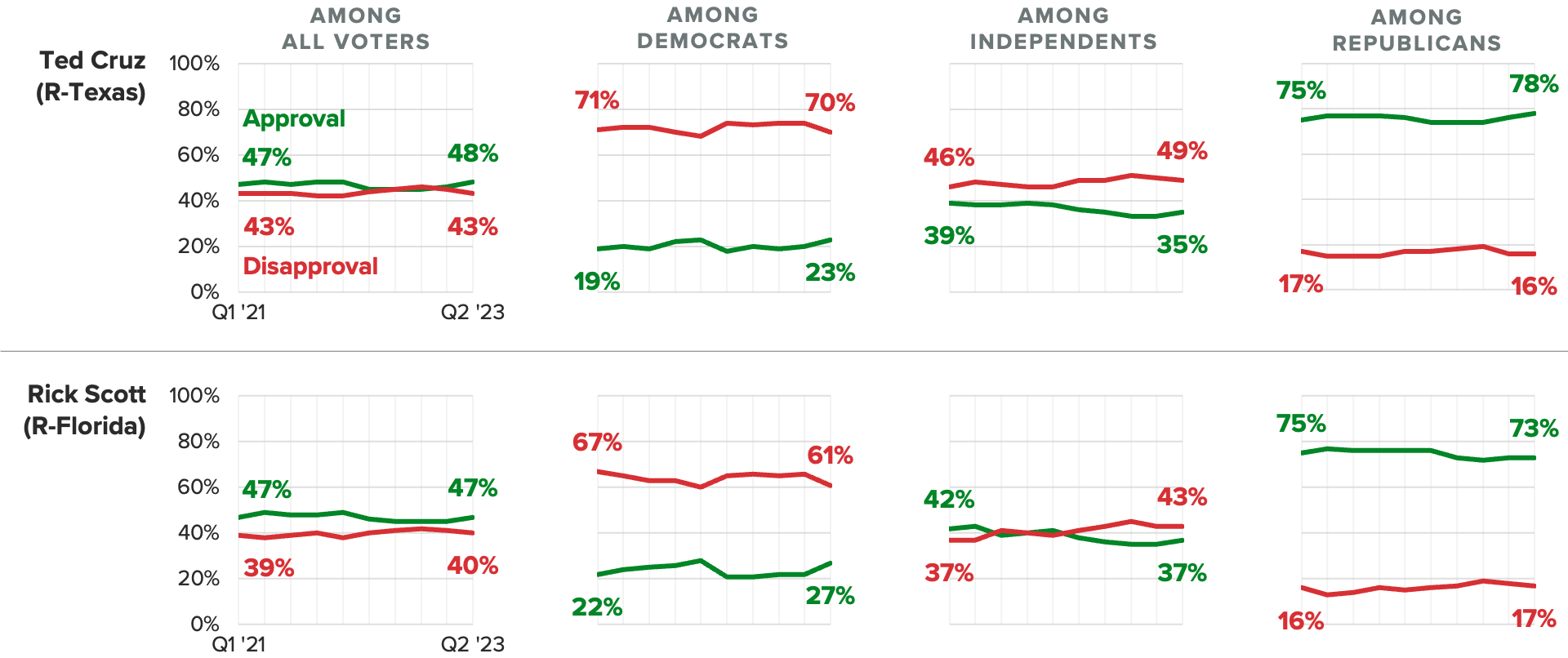
Cruz and Scott are more liked than not, with 48% of Texans and 47% of Floridians approving of their senator’s job performance. While both figures are slight improvements from late last year, they roughly match the senators’ standing at the start of Biden’s presidency.
Both are underwater with independents in their states but hold solid approval ratings among Republican voters.
How Americans view Senate freshmen
The end of the second quarter marked six months since the Senate’s new freshmen class took office, and at the outset of their six-year terms, Vermont Democrat Peter Welch looks like the home state star.
How 2023’s Freshmen Senators Are Viewed at Home
Roughly 3 in 5 Vermont voters approve of Welch’s job performance, while 31% disapprove. Only 8% of voters in Welch’s state don’t have an opinion of the senator, giving him the highest level of awareness compared with his six freshmen peers.
Welch is followed by Sen. Katie Britt (R-Ala.), who has a 54% approval rating. She has the strongest intraparty approval rating (74%) among the freshmen Republicans.
Sen. John Fetterman (D-Pa.) is the most unpopular freshman senator, with a 43% disapproval rating. That figure is up 3 points from the first quarter, when he faced media scrutiny while grappling with clinical depression at Walter Reed National Military Medical Center.
For Morning Consult’s state-level survey data, weights are applied to each state separately based on age, gender, education, race, homeownership, marital status, presidential voting history and — for a subset of states — race by education as well as an age-by-gender interaction.
Margins of error for responses from all voters in each state range from +/-1 to +/-6 percentage points.
For more detailed information, you can download the 50-state data set for senator approval ratings here.
Eli Yokley is Morning Consult’s U.S. politics analyst. Eli joined Morning Consult in 2016 from Roll Call, where he reported on House and Senate campaigns after five years of covering state-level politics in the Show Me State while studying at the University of Missouri in Columbia, including contributions to The New York Times, Politico and The Daily Beast. Follow him on Twitter @eyokley. Interested in connecting with Eli to discuss his analysis or for a media engagement or speaking opportunity? Email [email protected].


